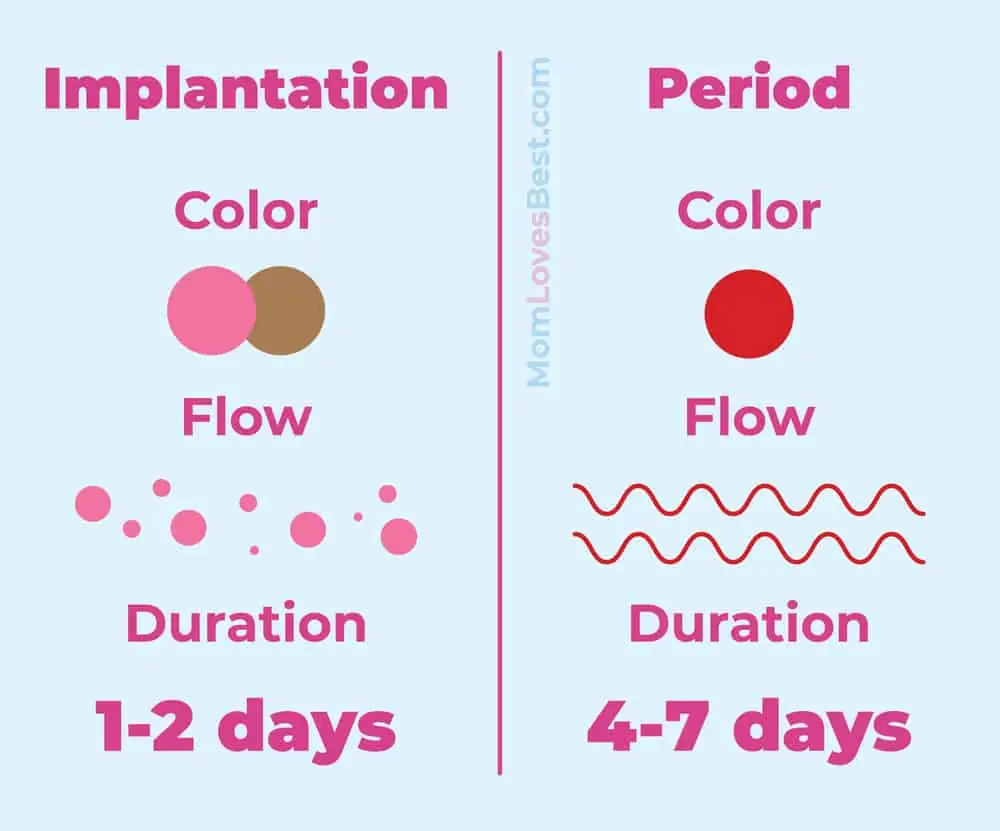Trying to conceive often makes us hyper-aware of every bodily sensation. If you notice spotting, it is natural to panic and wonder: is this an early pregnancy sign or just my period starting?
While it is easy to assume the worst, spotting is not always bad news. In fact, it might be the very first sign of a new life.
We will help you distinguish between a period and implantation bleeding, explain common misconceptions, and guide you on when to take a test.
Key Takeaways
- Implantation bleeding is light spotting that occurs when a fertilized egg attaches to the uterine lining, happening in roughly 25% of pregnancies.
- This spotting is typically pink or brown, free of clots, and lasts anywhere from a few hours to three days.
- Heavy bleeding is rarely associated with healthy implantation and may signal a period, ectopic pregnancy, or miscarriage.
- Avoid using tampons if you suspect you might be pregnant to prevent introducing bacteria to the uterus.
- Is Implantation Bleeding Normal?
- What Is Implantation Bleeding?
- When Does Implantation Bleeding Occur?
- Does Everyone Get Implantation Bleeding?
- What Does Implantation Bleeding Look Like?
- How Common Is Heavy Implantation Bleeding?
- How Common Is Late Implantation Bleeding?
- Does Heavy Bleeding Mean Twins?
- Bleeding: A Sign of Miscarriage?
- Can Bleeding Include Clots?
- Other Implantation Symptoms
- Tampons During Implantation Bleeding?
- Implantation Bleeding FAQs
Is Implantation Blood Normal During Pregnancy?
We have a familiar relationship with blood, but seeing it when you are hoping for a baby can be scary. However, our bodies expel blood for various reasons beyond a menstrual cycle, including hormonal shifts or irritation.
One of these reasons is implantation bleeding. It is a perfectly normal physiological response to early pregnancy, so take a deep breath.
What Is Implantation Bleeding?
Light spotting during early pregnancy is usually a sign that a fertilized egg has successfully lodged itself into the uterus lining.
As the egg travels down your fallopian tubes and nestles into the nutrient-rich uterine wall, it can rupture tiny blood vessels. This process causes mild irritation and results in light, harmless bleeding.
When Does Implantation Bleeding Occur?
Contrary to what many believe, the bleeding does not happen at the exact moment of conception. It is a delayed reaction.
Implantation generally occurs between 6 and 12 days after the egg is fertilized. Consequently, you likely won’t see spotting until about a week or so after ovulation (1). Because this timeline often aligns with when your period is due, it is very common to mistake this early pregnancy sign for a menstrual cycle.
Does Every Woman Experience Implantation Bleeding?
No, usually only about 25% to 30% of pregnant women experience noticeable implantation bleeding.
If you do not see any spotting, do not panic; you are actually in the majority. It is also possible to bleed such a small amount that you miss it entirely. Relying solely on spotting to confirm a pregnancy is tricky, so look for other concurrent symptoms like breast tenderness or fatigue.
What Does Implantation Bleeding Look Like?
Deciphering between a period and implantation spotting is easier if you know your cycle well. Picture your typical menstruation patterns and compare them to what you are currently seeing.
Here are the primary differences to watch for:
- Amount: Implantation bleeding is scanty. It should not be heavy enough to fill a pad or tampon. If the flow increases to a standard period level, you are likely not pregnant.
- Color: While period blood often turns bright red, implantation bleeding is usually pink (fresh blood) or dark brown (older blood). It rarely looks like the vibrant red of a full flow.
- Consistency: Implantation bleeding is thin and watery. It should never contain tissue or clots. If you see thick clumps, it is likely menstruation or a different issue.
- Duration: This spotting is fleeting. It may last a few hours or up to three days max. If the bleeding continues beyond three days, it is likely your period.
- Timing: Implantation spotting usually occurs a few days before your full period would start. If you see light pink spotting on day 24 of a 28-day cycle, it could be implantation.
Do not stress if your symptoms seem ambiguous. The only way to know for sure is to wait a few days and take a test.
How Common Is Heavy Implantation Bleeding?
True implantation bleeding is almost never heavy. There is minimal data supporting the idea that heavy flow is a sign of healthy implantation. While internet forums are full of anecdotal “exceptions,” heavy bleeding usually signals a period or a complication.
If you experience heavy bleeding combined with a positive pregnancy test, it could indicate an ectopic pregnancy. This occurs when the egg implants outside the uterus, such as in the fallopian tube (2). This is a medical emergency, so seek help immediately if you have heavy bleeding and severe pain.
How Common Is Late Implantation Bleeding?
Implantation occurs roughly 6 to 12 days after fertilization.
If implantation happens on the later end of that spectrum (days 10-12), the spotting might appear exactly when your period is due. This “late” bleeding causes confusion and often leads women to believe they aren’t pregnant until they miss their period the following month.
However, studies suggest that very late implantation (beyond 12 days) may carry a higher risk of early pregnancy loss. If you are worried about the timing, consult your OB-GYN.
Does Heavy Implantation Bleeding Mean Twins?
There is a common myth that more babies equal more bleeding. While carrying twins does increase hormone levels (HCG), there is no solid scientific evidence linking multiples to heavier implantation bleeding.
Implantation bleeding results from the mechanical disruption of the uterine lining. While two eggs implanting might technically disturb more surface area, the bleeding should still be light spotting, not a heavy flow. Do not rely on spotting volume to predict how many babies you are carrying.
Keep Your Doctor In The Loop
Is Implantation Bleeding a Miscarriage Sign?
It is difficult to see blood during pregnancy and remain positive. However, light implantation spotting is not a precursor to miscarriage; it is a mechanical result of the pregnancy establishing itself.
The key difference is progression. A miscarriage may start with spotting but will typically progress to heavier bleeding, severe cramping, and the passing of clots/tissue. Implantation bleeding remains light and resolves quickly, usually within 24 to 48 hours.
Can Implantation Bleeding Include Clots?
No. Implantation bleeding should be clot-free.
Clots form when blood pools in the uterus and is expelled in volume. Because implantation spotting is so light, there is simply not enough fluid to form clots. If you notice clotting, it is likely your period or, in rare cases involving pain and a positive test, a potential miscarriage (3).
Other Symptoms of Implantation
Because progesterone rises in both early pregnancy and the luteal phase of a menstrual cycle, symptoms often overlap.
However, many women report these specific changes alongside implantation spotting:
- Light cramping: You may feel mild prickling or pulling sensations as the egg attaches. This implantation cramping is usually less severe than period cramps.
- Lower back pain: Hormonal shifts relax your ligaments and joints, often causing a dull ache in the lower back.
- Headaches: The sudden surge in blood volume and hormones can trigger headaches.
- Mood swings: If you find yourself crying over a commercial or raging at traffic, mood swings caused by spiking hormones might be to blame.
Remember that symptoms vary wildly. The only definitive proof is a positive pregnancy test.
Are Tampons Okay During Implantation Bleeding?
You should never use tampons if you suspect pregnancy.
Insertion can introduce bacteria into the vaginal canal, which poses a risk to the cervix and uterus. Furthermore, implantation spotting is typically so light that a panty liner is sufficient. If you are bleeding enough to require a tampon, it is likely menstruation.










